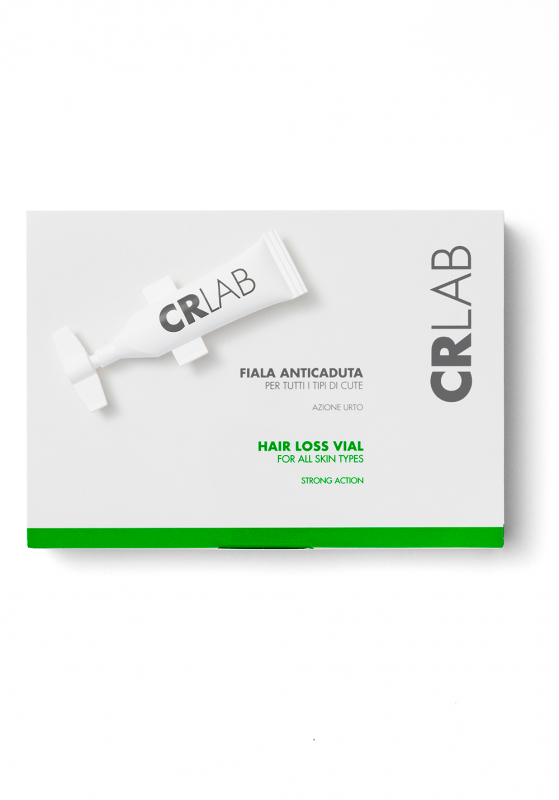Scalp Care & Hair Care
Hair loss: the causes you can act on

Hair loss is first and foremost a normal physiological process involving hair turnover.
Often, especially in women, it is a temporary phenomenon. In fact, hair is a skin attachment that follows a regular life cycle: it grows, falls out, and regrows. Other times, however, there are pathological causes that cause this issue: so when to worry? When is it necessary to use a hair loss treatment?
Knowing your hair and its characteristics helps you better understand how to avoid that it falls. Thus, let’s find out what the life stages of hair are, what causes it to fall out, and what are the most effective remedies to make it healthy and thick.
Table of Contents:
– Hair life cycle
– Main causes of hair loss
– How to prevent hair loss
– Remedies and treatments
Hair loss: life cycle
Thick hair is considered a symbol of beauty and is usually associated with good health. However, we often forget that the falling of hair is generally a natural phenomenon consisting of three stages:
– anagen, the phase of hair growth that lasts 2 to 4 years in men and 3 to 7 years in women;
– catagen, the natural phase of the gradual discontinuation of the hair’s vital functions that can last from 2 to 3 weeks;
– talogen, the final phase of the hair’s life cycle or functional resting period that can last 2 to 3 months: before falling out, the hair may remain on the scalp for several weeks.
When the last phase is over, a new hair life cycle begins. Therefore, one should not worry about falling hair when it is physiological. It is a natural life cycle that repeats at least 20 times during a person’s lifetime. The problem, as we will see later, occurs when physiological hair loss becomes permanent.
Main causes of hair falling off
We have clarified that the physiological causes of hair loss include the natural process of growth, fall out, and regrowth; however, we should not forget to care for and nourish the hair properly as there are other reasons, including pathological ones, that can put a strain on hair health.
Hair loss can also be caused by organic and environmental phenomena, or related to lifestyle and dietary habits. Generally, when it occurs, the causes can be traced to:
– stress, smoking and alcohol
– change of season
– Aggressive cosmetic treatments
– environmental pollution
– hereditary phenomena
– Hormonal changes or imbalances
– Drastic diets
– alopecia and seborrhea
– Anorexia and bulimia
– Vitamin A and zinc deficiency
– anemia
– diabetes
– Thyroid and hepatic dysfunction
some drugs.
Seasonal causes for the loss of hair
In the spring and fall months, an increase in falling hair is usual in both women and men. In spring and fall there is a significant acceleration in the life cycle of hair, a period where the change in temperature affects its regeneration.
There are several theories trying to explain this phenomenon. Among the most popular are:
– Genetic causes: a process closely related to hair change typical of mammals
– change in the ratio of hours of light to dark: some experts argue that altering this ratio causes a hormonal imbalance responsible for hair loss
– psychological and social causes: autumn comes with the return to the stressful life of work and study after summer vacation, with hectic pace and smog affecting hair health.
Losing hair in the fall or spring season is physiological and should not be a concern unless it is excessive. In cases where the ratio of fallen hair to growing hair is unbalanced in favor of the former, however, the cause may be pathological, and thus it is worth paying attention to the presence of itchy head, scalp pain, dandruff, and oily hair. In such a case, it is advisable to check the situation with a professional who will provide all the useful information on how to prevent the loss and what treatment to follow.
Stress and losing one’s hair
There is no scientific evidence to prove a correlation between stress and hair loss; however, the experience of many people often suggests that a link exists. In these cases, the cause may be psychogenic alopecia, a psychosomatic disorder resulting from fatigue and nervousness. Our body reacts to stress by releasing certain hormones that reach the cells responsible for hair growth. This causes overproduction of sebum in the scalp resulting in malfunctioning follicles and thus the loss of hair.
How to avoid it if it is due to stress, then? Ideally, the root cause of the stress and anxiety should be eliminated. It is not easy considering the hectic life that characterizes our society. Thus, it is usually useful to resort to a hair loss treatment following a procedure to strengthen the scalp and stimulate the growth of new healthy hair.
Genetic causes: androgenetic alopecia and seborrheic dermatitis
Androgenetic alopecia is the leading cause of progressive loss of hair. It is also called “common baldness” because it affects about 80 percent of men and 50 percent of women: within certain limits, in fact, it is considered a physiological condition. For androgenetic alopecia to occur, the presence of androgenic hormones and hair follicles genetically predisposed to undergo their stimuli is necessary.
Due to dihydrotestosterone, an androgenic derivative of testosterone that is also formed at the level of hair follicles, hair becomes shorter and thinner until it can no longer cover the scalp. This process occurs because the anagen phase is increasingly reduced in favor of the catagen and telogen phases. However, the genes that make people predisposed to baldness are still unknown, which is why androgenetic alopecia is considered a polygenic disease, meaning that it is caused by different genes.
Seborrheic dermatitis can also contribute to progressive fall of hair. It is a hereditary skin disease caused by an overproduction of sebum by the sebaceous glands. Inflammation of the scalp causes itching, redness, and scale formation; in particular, itching exposes the hair to continuous trauma and together with excessive sebum production facilitates hair loss.
How to prevent hair loss
Against alopecia and hereditary hair loss, there are no miracle cures. However, it is generally possible to prevent and fight hair loss by acquiring some new habits. The first step is to follow a well-balanced diet rich in vitamins, proteins, and minerals: hair nutrition, in fact, occurs through the blood supply to the scalp, not externally. Other tips on how to prevent this problem are the following:
– Reduce the use of hair dryers, brushes, straighteners and thermal curlers, which weaken hair proteins with heat
– Reduce the use of chemical hair dyes and treatments
– Use a gentle brush in a top-to-bottom motion
Massage the scalp with egg oil occasionally.
Remedies and treatments
Remedying permanent physiological hair loss is possible if action is taken before reaching the advanced stage of scalp thinning. Of paramount importance is the work of professionals who are able to assess each individual case based on the person’s history and trichological examinations.
But how to avoid physiological causes? The professionals at CRLAB have designed specific products in the format of a treatment that can fight these effects. The hair loss treatment lotion by CRLAB effectively fights the loss of hair through its antioxidant properties and delivery of nutrients and oxygen to the hair follicles. With these remedies, hair that tends to fall out again gains volume, strength and vitality.
The solution created by CRLAB ‘s labs satisfied 100% of patients who underwent a 3-month treatment, finding hair thickening with 17-23% more volume. Thanks to CRLAB ‘s hair loss treatment lotion, hair becomes healthy, strong and thick: a dream come true.

HAIR LOSS PREVENTION LOTION
The HAIR LOSS PREVENTION Lotion – maintenance treatment
The HAIR LOSS PREVENTION Lotion – maintenance treatment – invigorates microcirculation by promoting the supply of nutrients and oxygen to the hair follicle. It has high antioxidant qualities and effectively combats hair loss by correctly balancing the nutrients within the hair bulb. Thuja oil has purifying and protective properties that strengthen the hair structure. Calendula improves microcirculation. Ruby extract is a source of minerals such as iron and chromium.
 Italiano
Italiano  Português
Português  Français
Français  Español
Español